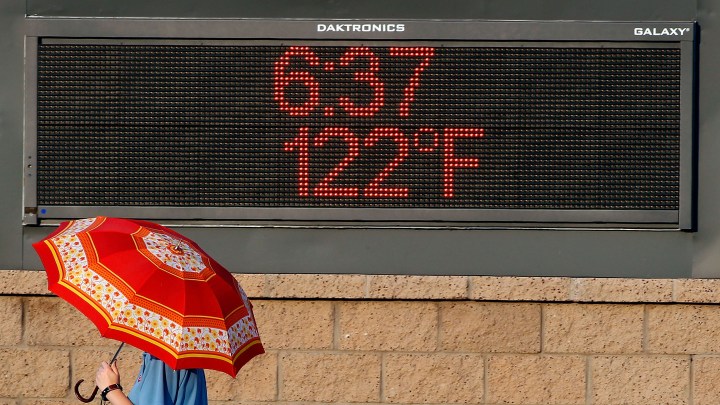
How businesses can better prepare for climate change
Last month, July of 2023, was the hottest on record. Indeed it has been a summer of climate anxiety: record-breaking heat across the country and the world, extraordinary wildfires raging in Canada and Hawaii, severe flooding in Vermont, to name just a few of the extremes. These events represent a changing world, which means it’s a changing world for all of the workers who experience it. This raises a question about responsibility for employers: To what extent do businesses have to adapt so their employees can get the job done in a changing climate?
Jennifer Moss is a workplace culture strategist, international speaker and award-winning author. She spoke about this with “Marketplace Morning Report” host David Brancaccio. The following is an edited transcript of their conversation.
Brancaccio: We think right away of road crews or delivery people working outside in very hot conditions, hotter conditions. Crucial issue, right? But it’s more than that that you’re thinking about.
Moss: Yeah, I mean, we’re seeing this across the board. Now, when you look at the reports of readiness for global organizations, it shows that around two-thirds of large companies have at least one asset highly exposed to the physical risk of climate change. And yet, only one in five companies has a plan in place to adapt to these risks. So we’re seeing more and more companies take an effort to get prepared to handle some of these big situations, these crises, but a lot of people are still very unprepared.
Brancaccio: All right, so a workplace may be air conditioned on the inside. But that may not help if it’s six inches above sea level and at risk for getting flooded out.
Moss: That’s exactly it. And we’re seeing companies realize that they have to change their facilities, get prepared. When you really look at the impact if they don’t, I mean, we’re looking at, for example, Amazon, heat is placing a deep threat on retention. They had 100% turnover last year, and they’re finding that some of the reasons why people are leaving are because of heat and stress.
Brancaccio: In many business contracts, there’s something called the force majeure. If something giant happens, an act of God, you can get out of the contract. But if there is a big natural disaster, a force majeure that happens, and employees can’t get into work normally, I don’t see anything in many employee handbooks that tells you what the rules are supposed to be.
Moss: We’re starting to see more organization setting up emergency savings benefits, but it’s pretty nebulous, you know. There are not a lot of concrete policies, and that’s why we need it codified into the the government. We’re seeing a massive competition in talent, and we’re going to continue to see this talent shortage. And so if you’re a company that’s really clear in how you are going to support people in these environments, in these dangerous environments, in this future of real impact from climate change, you’re going to be the organization that stands above.
There’s a lot happening in the world. Through it all, Marketplace is here for you.
You rely on Marketplace to break down the world’s events and tell you how it affects you in a fact-based, approachable way. We rely on your financial support to keep making that possible.
Your donation today powers the independent journalism that you rely on. For just $5/month, you can help sustain Marketplace so we can keep reporting on the things that matter to you.











